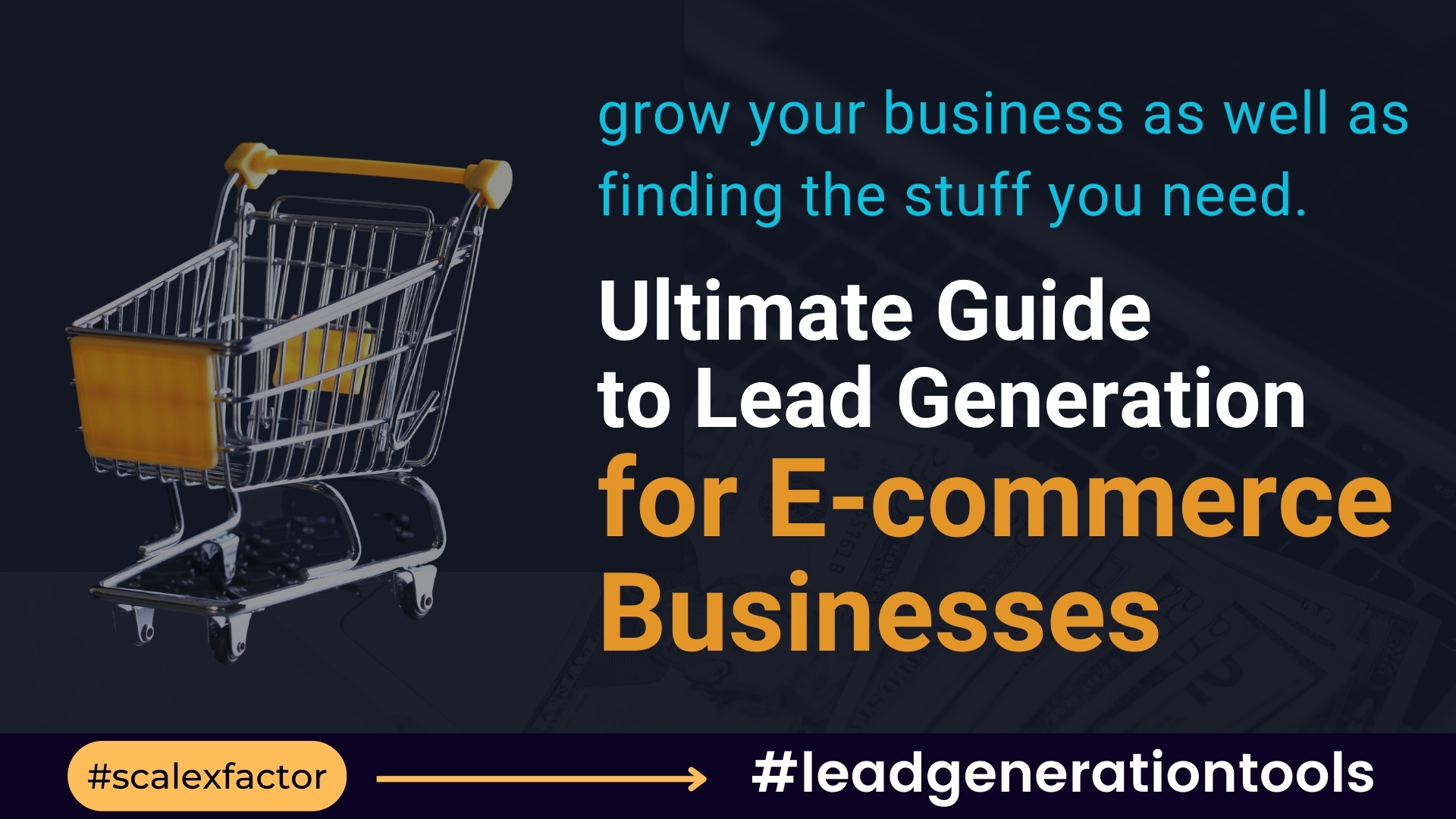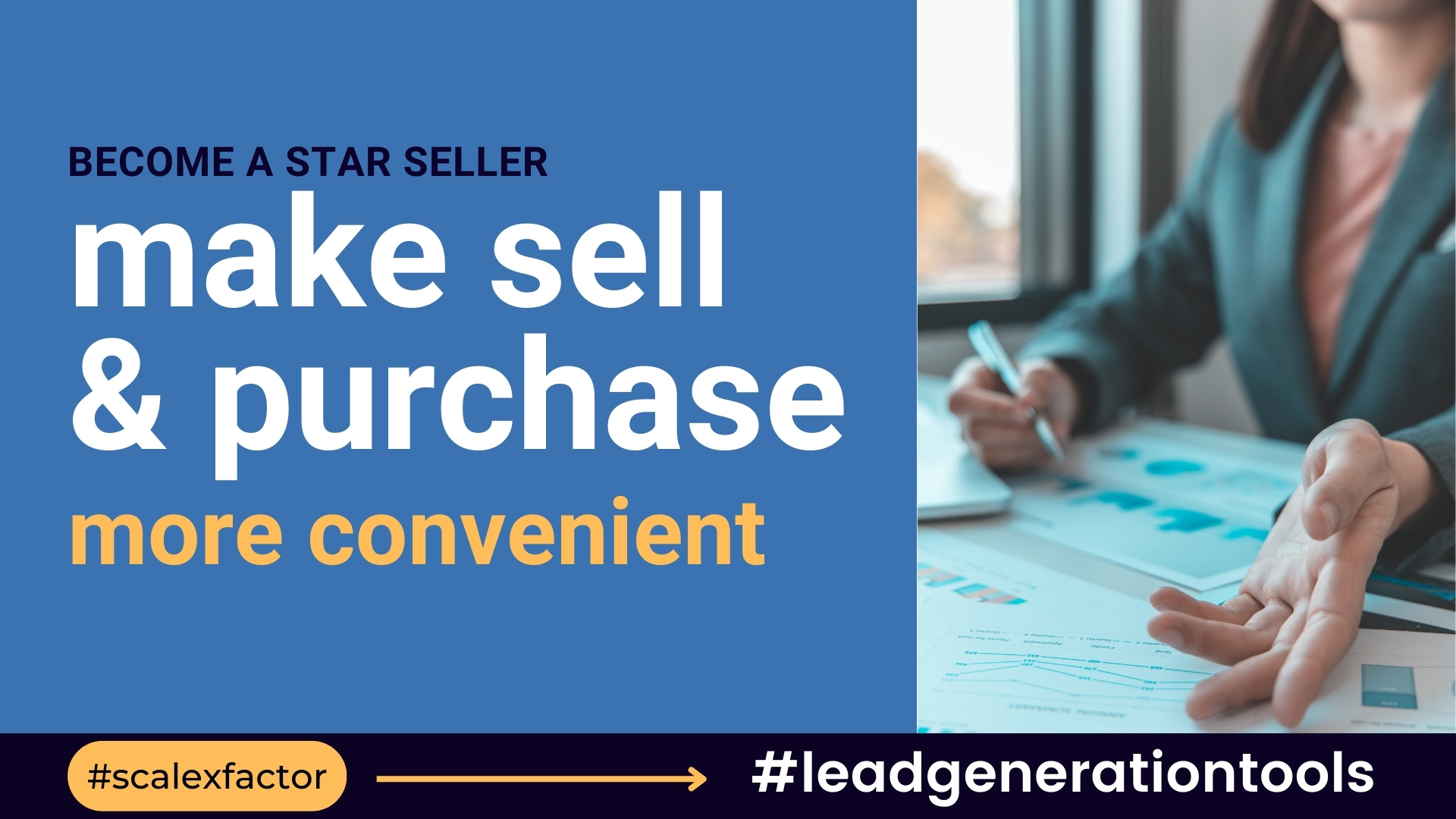Introduction: Why Lead Generation Matters for E-commerce
In the highly competitive world of e-commerce, businesses are constantly striving to attract new customers and increase their sales. One of the most effective ways to achieve this is through lead generation. But what exactly is lead generation, and why is it crucial for e-commerce success?
What is Lead Generation?
Lead generation refers to the process of identifying and capturing potential customers, known as leads, who have shown interest in a product or service. These leads are individuals who have expressed their willingness to learn more about a company’s offerings or have provided their contact information.

Why is Lead Generation Important for E-commerce Businesses?
Lead generation is essential for e-commerce businesses for several reasons:
- Increased Sales: By generating leads, e-commerce businesses have a higher chance of converting those leads into paying customers, ultimately increasing sales.
- Business Growth: A steady stream of leads allows e-commerce businesses to grow their customer base and expand their market reach.
- Cost-Effectiveness: Compared to traditional advertising and marketing methods, lead generation can be a more cost-effective strategy, as it targets potential customers who are already interested in the products or services being offered.
- Targeted Marketing: Lead generation enables businesses to focus their marketing efforts on specific segments of the market, ensuring that their messages reach the right audience.
Understanding the Lead Generation Process
To effectively generate leads for your e-commerce business, it is crucial to understand the lead generation process and the various stages involved.
Stage 1: Attracting Visitors to Your Website
The first step in lead generation is attracting visitors to your e-commerce website. This can be achieved through various marketing channels and strategies, such as:
- Content Marketing: Creating valuable and informative content that appeals to your target audience. This could include blog posts, articles, videos, and infographics.
- Search Engine Optimization (SEO): Optimizing your website for search engines to increase organic traffic. This involves keyword research, on-page optimization, and link building.
- Social Media Marketing: Leveraging social media platforms to promote your products or services and engage with potential customers.
- Paid Advertising: Running targeted ads on platforms like Google Ads, Facebook Ads, or Instagram Ads to drive traffic to your website.
Stage 2: Converting Visitors into Leads
Once you have attracted visitors to your website, the next step is to convert them into leads. This involves capturing their contact information, such as email addresses or phone numbers. Here are some effective strategies for lead conversion:
- Compelling Call-to-Actions (CTAs): Placing persuasive CTAs throughout your website that encourage visitors to take the desired action, such as signing up for a newsletter or requesting a free trial.
- Lead Magnets: Offering valuable incentives, such as e-books, guides, or discount codes, in exchange for visitors’ contact information.
- Exit Intent Pop-ups: Displaying targeted pop-up messages when visitors are about to leave your website, offering them an irresistible offer or discount to encourage them to stay or provide their contact information.
Stage 3: Nurturing and Engaging Leads
Once you have captured leads, the next step is to nurture and engage them to build a relationship and increase the likelihood of conversion. Here are some effective lead nurturing strategies:
- Email Marketing: Sending personalized and relevant emails to your leads to provide them with valuable information, product updates, and exclusive offers.
- Marketing Automation: Utilizing automation tools to send targeted messages and content based on the leads’ behavior and interests.
- Segmentation: Categorizing your leads into different groups based on their demographics, preferences, or behavior and tailoring your marketing messages accordingly.
Stage 4: Converting Leads into Customers
The ultimate goal of lead generation is to convert leads into paying customers. To achieve this, you need to:
- Provide a Seamless Buying Experience: Ensure that your e-commerce website is user-friendly, with easy navigation, intuitive design, and secure payment options.
- Personalization: Tailor your marketing messages and product recommendations based on the leads’ preferences and browsing history.
- Remarketing: Retarget leads who have shown interest in your products or services but haven’t made a purchase yet, through strategic ads and personalized offers.
Frequently Asked Questions (FAQ)
1. What are some effective lead generation tools for e-commerce businesses?
There are several effective lead generation tools available for e-commerce businesses, such as:
- Lead capture forms: Tools like Hello Bar, OptinMonster, or Sumo enable you to create attractive and customizable lead capture forms.
- Customer relationship management (CRM) software: CRM platforms like Salesforce, HubSpot, or Zoho CRM help you manage and track your leads effectively.
- Email marketing tools: Platforms like Mailchimp, Constant Contact, or Sendinblue provide features for creating and automating email marketing campaigns.
2. How can I measure the success of my lead generation efforts?
To measure the success of your lead generation efforts, you can track various metrics, including:
- Conversion rate: The percentage of leads that become paying customers.
- Cost per lead: The average cost incurred to generate a single lead.
- Return on investment (ROI): The financial return you receive from your lead generation efforts compared to the cost.
3. Is lead generation a one-time effort?
No, lead generation is an ongoing process. To maintain a steady flow of leads, you need to consistently attract, convert, and engage potential customers. Regularly evaluating and optimizing your lead generation strategies is essential for long-term success.
4. Are there any ethical considerations in lead generation for e-commerce businesses?
Yes, ethical considerations play an important role in lead generation. It is crucial to obtain consent from leads before sending them marketing communications. Additionally, ensuring the security and privacy of their personal information is essential.
5. How long does it take to see results from lead generation efforts?
The time it takes to see results from lead generation efforts can vary depending on various factors, such as your industry, target audience, and the effectiveness of your strategies. It is important to have realistic expectations and consistently monitor and optimize your lead generation activities.
In the fiercely competitive landscape of e-commerce, businesses are continuously exerting efforts to entice fresh customers and enhance their sales figures. Among the multitude of strategies available, lead generation tools stand out as one of the most effective methods. But what precisely are lead generation tools, and why do they play a crucial role in driving e-commerce success?
Understanding the Significance of Lead Generation Tools in E-commerce

In the highly competitive world of e-commerce, businesses strive to attract new customers and boost their sales figures. Lead generation tools offer a powerful solution to achieve these goals effectively. But what exactly are lead generation tools, and why are they essential for e-commerce success?
What are Lead Generation Tools?
Lead generation tools encompass a range of software, platforms, and techniques designed to identify and capture potential customers, known as leads. These tools facilitate the process of acquiring contact information or other valuable data from individuals who have demonstrated an interest in a business’s products or services.
Why are Lead Generation Tools Crucial for E-commerce Success?
Lead generation tools play a vital role in the success of e-commerce businesses due to the following reasons:
- Enhanced Customer Acquisition: Lead generation tools enable businesses to identify and attract potential customers who are more likely to convert into paying customers. By focusing their efforts on qualified leads, businesses can optimize their customer acquisition strategies and increase sales.
- Efficient Resource Allocation: With lead generation tools, businesses can streamline their marketing efforts by targeting specific customer segments. By focusing on leads that have already expressed interest, businesses can allocate their resources more efficiently, optimizing their marketing budget and improving overall return on investment (ROI).
- Personalized Marketing Approach: Lead generation tools provide businesses with valuable insights into the preferences and behavior of their leads. This information allows businesses to tailor their marketing messages, offers, and product recommendations to align with the specific needs and preferences of their target audience.
- Improved Conversion Rates: By utilizing lead generation tools, businesses can implement effective lead nurturing strategies. By nurturing leads with relevant and personalized communication, businesses can build trust, establish relationships, and increase the likelihood of conversion.
In conclusion, lead generation tools are invaluable assets for e-commerce businesses operating in a highly competitive landscape. By utilizing these tools effectively, businesses can attract and capture qualified leads, optimize their marketing efforts, and ultimately drive success in the e-commerce industry.
Conclusion: Mastering Lead Generation for E-commerce Success
Lead generation is a vital component of any successful e-commerce business. By attracting, converting, nurturing, and ultimately converting leads into customers, you can boost your sales, expand your customer base, and achieve long-term growth. Remember to continually evaluate and optimize your lead generation strategies to stay ahead of the competition and provide a seamless experience for your potential customers




